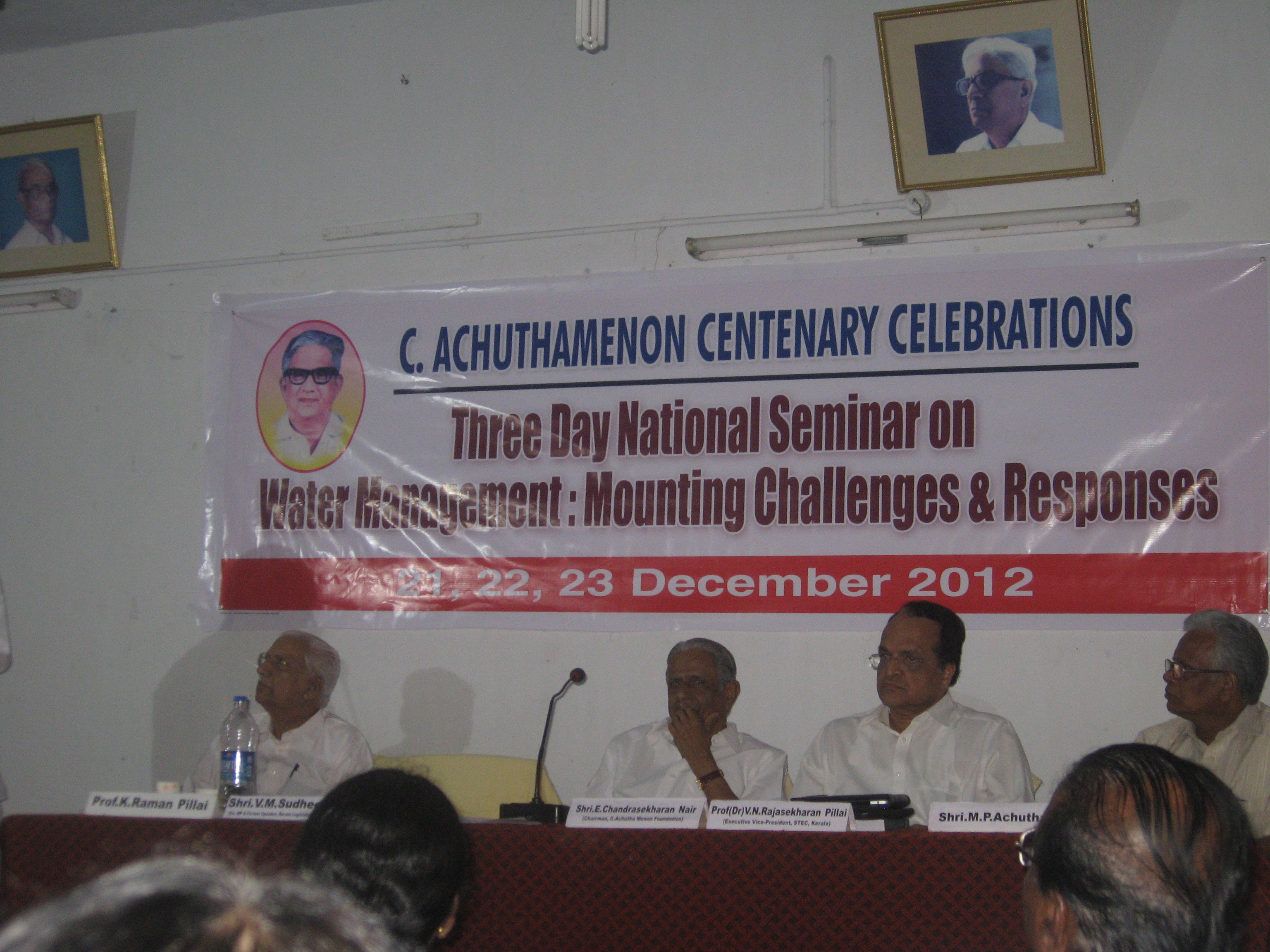/topics/conservation-reducing-water-usage
Conservation - Reducing Water Usage
A commerce ex-lecturer from Karnataka's Udupi district converts 25 acres of barren land into a lush green farm through rainwater harvesting
Posted on 20 Mar, 2013 05:46 PMThis story of the untiring efforts of a commerce ex-lecturer to convert twenty five acres of a barren piece of land into a self sustainable green farm, provides an ideal example of a model for rainwater harvesting and demonstrates how persistence and the sheer determination to go on till the end, can yield miraculous results.

Experiences from a civil society initiative to restore stretches of toxic Yamuna: Report of a conference organised by PEACE, Thames River Restoration Trust and WWF India at New Delhi in March 2013
Posted on 16 Mar, 2013 09:12 PMDr Peter Spillet of the Thames River Restoration Trust shared that the Trust was the recipient of the 2010 Theiss International Riverprize funds on behalf of many organizations involved in the restoration work on river Thames in United Kingdom. He said that the Trust had shared the money for twinning projects in various countries including in India.
Water management - Mounting challenges and responses - A report on the three day seminar jointly organised by KSCSTE and C Achutha Menon Foundation, Trivandrum from the 21st to the 23rd December 2012
Posted on 14 Mar, 2013 10:12 PMThis three day national seminar was jointly organised by the Kerala State Council for Science, Technology and Environment (KSCSTE), Thiruvananthapuram, and the C Achutha Menon Foundation (AMF), Thiruvananthapuram, Kerala and included presentations and discussions on a range of water related themes such as water scarcity, water conservation, commercialisation of water, water conflicts and water management.
The seminar aimed at creating awareness and triggering a dialogue among scientists, academicians, researchers, activists, as well as lay people on the emerging challenges related to water resources, water quality and water conservation in the state of Kerala. The seminar was inaugurated by Shri V M Sudheeran, Ex MP and former speaker, while Dr Rajasekaran Pillai, Executive Vice President KSCSTE, delivered the keynote address with the felicitation by Shri M P Achuthan, MP.
The seminar included discussions under five different themes related to water issues that included water scarcity, water conservation, commercialisation of water, water as an new area for conflicts and water management.

The three day seminar on water management at the Achuta Menon Foundation, Trivandrum, Kerala
Conference report: The Anil Agarwal Dialogue on "Excreta does matter", organised by Centre for Science and Environment on 4-5 March 2013 at New Delhi
Posted on 12 Mar, 2013 03:23 PMA close examination of these two issues shows that the water and sewage challenge is already grave and could get worse. With this as the backdrop, Centre for Science and Environment (CSE), a public interest research and advocacy organisation based in New Delhi, organised a two day conference called the Anil Agarwal Dialogue on “Excreta does matter”. The conference took place at the Jacaranda Hall, India Habitat Centre, Lodhi Road, New Delhi on 4 and 5 March 2013.
The dialogue aimed at furthering the agenda of CSE’s seventh State of India’s Environment report titled Excreta Matters. This report is a comprehensive survey of the situation of water and wastewater management in 71 Indian cities. The study found that most cities lack a basic policy direction on how best to tackle issues of demand, supply and treatment of water, and of management of sewage.
The Dialogue being the first of its kind brought together a wide range of professionals, activists, practitioners, policy makers, academicians, researchers and administrators from the water sector. The event was aimed at drawing attention on the critical issues of how cities will get affordable and sustainable water and waste systems that can supply to all and take back and treat the sewage of all.

Bangalore garbage finds dumping place in Mandur: Civic body promises better infrastructure projects in exchange - Roundup of the week’s news (March 4- March 10, 2013)
Posted on 11 Mar, 2013 11:42 PMBangalore garbage finds dumping place in Mandur: Civic body promises better infrastructure projects for communities living there
Water in movies: Exploring the role of water in mainstream media and popular culture
Posted on 11 Mar, 2013 03:20 PMFrom the serious to the absurd, water has featured across a breadth of movies, both in Hollywood and Bollywood.
How do groundwater irrigation and energy supply influence each other ? - Talks from the IWMI-Tata Annual Partners' Meet held at Anand in November 2012
Posted on 10 Mar, 2013 01:03 PMIndia is the world's largest consumer of groundwater where it is extensively used for irrigation. However, there is a considerable waste of this valuable resource. While a part of this waste can be attributed to a lack of incentive for conservation, unmetered electricity supply contributes greatly to this problem. This has led to the formation of what is being termed an energy-irrigation nexus.
Several sessions at the IWMI-Tata Annual Partners' Meet in 2012 discussed this phenomenon, its causes, impact and possible management strategies.
A source today, scarce tomorrow: Educational videos on global freshwater problems
Posted on 09 Mar, 2013 09:10 AMWhat are the water sources and where is the water utilized ? The short videos below aim to educate us on simple facts of freshwater sources and scarcity....
Manuals for preparation of detailed project report for rural piped water supply schemes by Ministry of Drinking Water and Sanitation
Posted on 08 Mar, 2013 05:33 PMThe works have to done maintaining appropriate standards and quality of the schemes, and ensure their completion in time. The manuals are prepared keeping in mind the activities mentioned in the 12th five year plan.
Uniform drinking water quality monitoring protocol- A document by Ministry of Drinking Water and Sanitation (2013)
Posted on 07 Mar, 2013 08:36 PMThese protocols are suggestive in nature and will be useful for laboratory personnel, water supply engineers and policy makers working in the drinking water sector operating at State, District and Sub-district levels.





